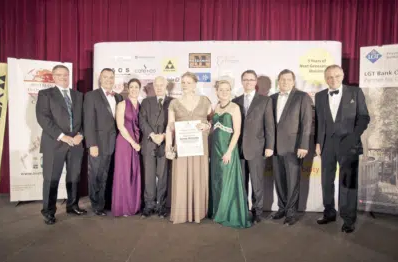The Austrian Economics Center and the Hayek Institut congratulate Deirdre McCloskey on becoming a Fellow of the Erasmus Historical and Cultural Research Forum. Next week, on June 1, the London School of Economics is celebrating its Deirdre McCloskey inaugural lecture as a Fellow of the Erasmus Forum. This inaugural edition of the lecture will be held by McCloskey herself on The Near Impossibility of Policy. We at the Austrian Economics Center want to congratulate our long-time friend for this prestigious distinction. McCloskey has been a trailblazer and defender of classical liberalism for many decades. From economics to women’s rights, and her defense of the rights of all human beings, Deirdre has never wavered in her goal to promote classical liberalism.
Topics:
Simon Sarevski** considers the following as important: 6b.) Austrian center, 6b) Austrian Economics, Economics, Featured, newsletter, Politics
This could be interesting, too:
Investec writes The Swiss houses that must be demolished
Claudio Grass writes The Case Against Fordism
Nachrichten Ticker - www.finanzen.ch writes Die Performance der Kryptowährungen in KW 9: Das hat sich bei Bitcoin, Ether & Co. getan
Nachrichten Ticker - www.finanzen.ch writes Wer verbirgt sich hinter der Ethereum-Technologie?
The Austrian Economics Center and the Hayek Institut congratulate Deirdre McCloskey on becoming a Fellow of the Erasmus Historical and Cultural Research Forum.
Next week, on June 1, the London School of Economics is celebrating its Deirdre McCloskey inaugural lecture as a Fellow of the Erasmus Forum. This inaugural edition of the lecture will be held by McCloskey herself on The Near Impossibility of Policy. We at the Austrian Economics Center want to congratulate our long-time friend for this prestigious distinction.
McCloskey has been a trailblazer and defender of classical liberalism for many decades. From economics to women’s rights, and her defense of the rights of all human beings, Deirdre has never wavered in her goal to promote classical liberalism. As an acclaimed economist, she has won many accolades and awards. In 2014 McCloskey received the Hayek Lifetime Achievement Award (pictured; her acceptance speech), in recognition of “her academic contributions to a better understanding and advancement of individual liberty and freedom” – as the certificate says, signed by Nobel Laureate Vernon Smith, honorary president of the Friedrich A. v. Hayek Institut in Vienna, Austria. As she remarked back then, “as soon as I understood economics, I became, in essence, an Austrian Economist. Before I even knew much about it, I understood that markets work without a centralized erection, and they work through the cooperation of millions.”
McCloskey began her contributions to the economics community shortly after her graduation from Harvard University. Her dissertation on British iron and steel was received highly and won her the David A. Wells Prize in 1973. Subsequently, McCloskey began her career in academia as an associate professor of economics at the University of Chicago in 1968. She eventually gained tenure.
Since her time in the academic world, McCloskey has written or edited 23 books and has been published hundreds of times. Perhaps her most notable contribution is her work on the Bourgeois trilogy which includes the works The Bourgeois Virtues: Ethics for an Age of Commerce, Bourgeois Dignity: Why Economics Can’t Explain the Modern World, and Bourgeois Equality: How Ideas, Not Capital or Institutions Enriched the World. In her first work of the series which was published in 2006, McCloskey explains the seven virtues and the relationship they have with the Bourgeois and Christianity. Her second work published in 2010 explains how the increase in human welfare during the 19th and 20th centuries is derived from innovation rather than accumulation of wealth. Her final work of the trilogy was published in 2016 and expanded on her 2010 work. Through this work, the term Great Enrichment was coined.
Through this essential trilogy, the economist’s view of why the world became so wealthy and how industrialization arose has further developed. For many decades, economists had previously thought that we owe the wealth to thrift and capital – or perhaps even imperialism – and secure property rights. But McCloskey shows how a change in people’s ideas toward innovation and ‘bourgeois virtues’ brought and is fostering the continuation of (material) improvement.
We at the Austrian Economics Center would like to once more acknowledge the massive achievements that Deirdre McCloskey has obtained through her work. With the upcoming LSE McCloskey lecture series, her status as an economist long to be remembered will be further cemented – as well as the fact that we will study her work for a long time to come.
Tags: Economics,Featured,newsletter,Politics






